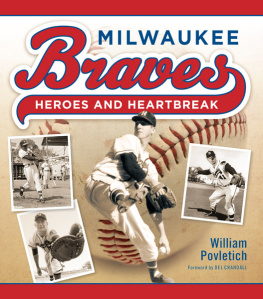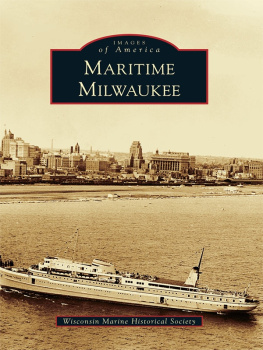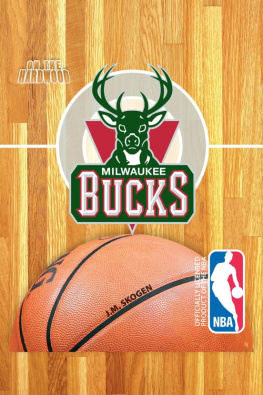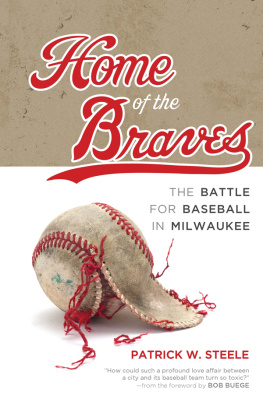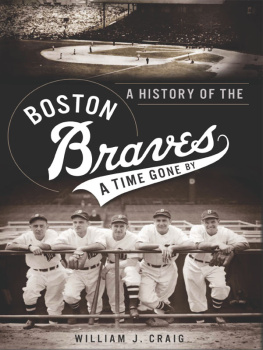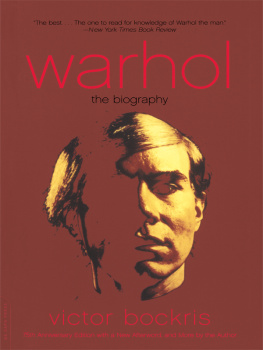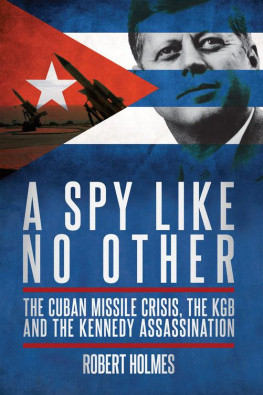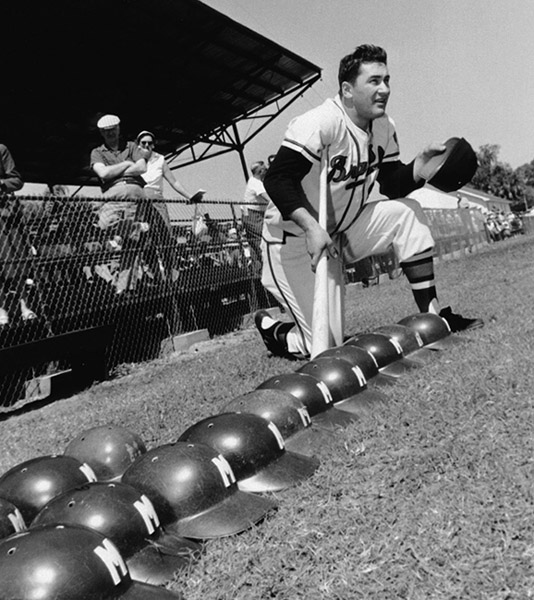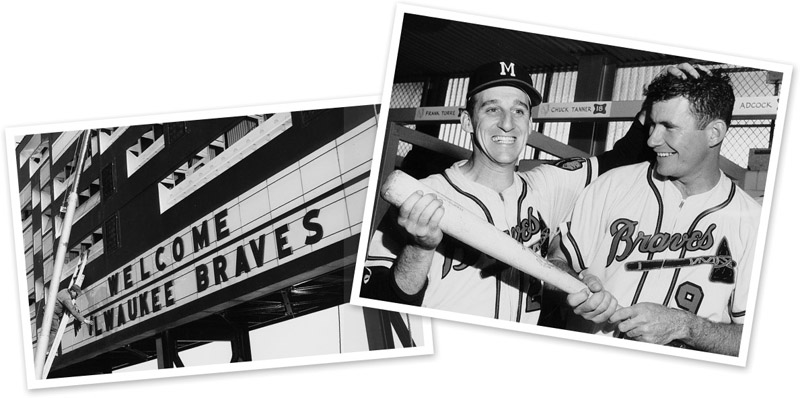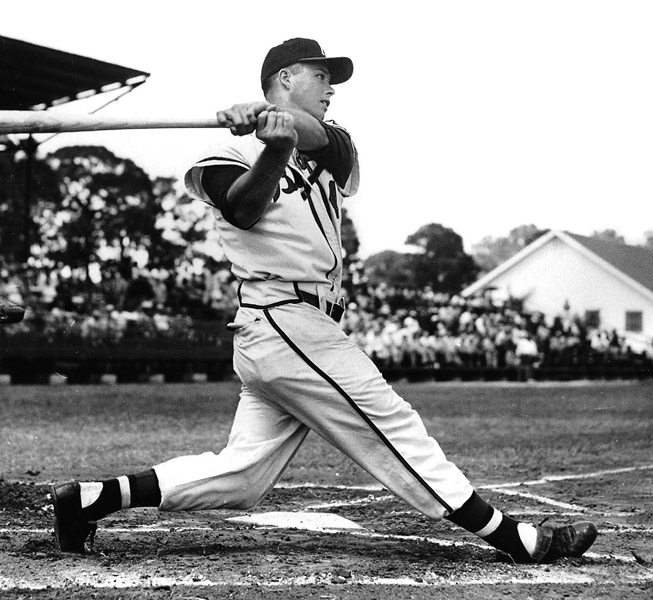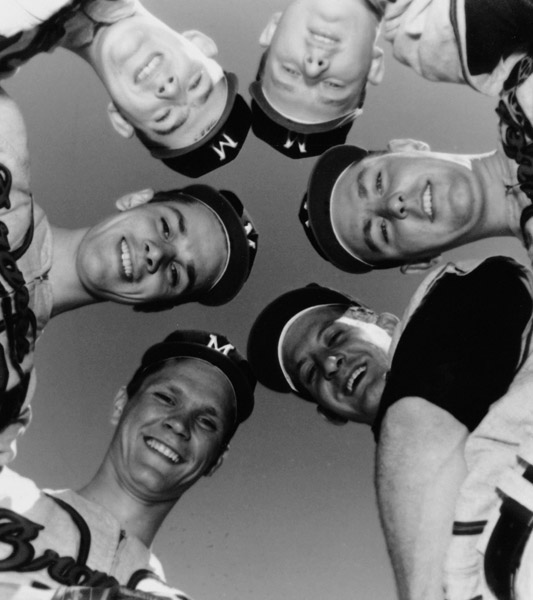Praise for Milwaukee Braves: Heroes and Heartbreak
Chronicles a return to the Milwaukee and Wisconsin that time has all but forgotten. It was a time when County Stadium was the place to be, a time when many of the ballplayers stayed year-round and worked in public relations for Miller or Blatz during the off-season, a time when players never had to pay for a meal and always got a free car to drive. It was all Braves, all the time. The Milwaukee Braves are long gone. So are high-kicking pitchers like Warren Spahn, double headers, streetcars to the stadium. But the Milwaukee Braves are a reminder of what we were . Fortunately for avid baseball fans, this book brings the Milwaukee Braves back to life.
BUD LEA, FORMER SPORTS EDITOR, MILWAUKEE SENTINEL
William Povletichs unprecedented offering details a unique love affair between a region and a team. Beyond the heroes, and the magical moments that occurred on the field, the book also captures the behind-the-scenes events that catapulted baseball into big business.
RICK SCHABOWSKI, PRESIDENT OF THE KEN KELTNER BADGER STATE CHAPTER OF SABR (SOCIETY FOR AMERICAN BASEBALL RESEARCH)
I enjoyed Milwaukee Braves: Heroes and Heartbreak very much. A good read, with great memories.
TOM COLLINS, FORMER TELEVISION COMMENTATOR FOR THE MILWAUKEE BRAVES AND MILWAUKEE BREWERS
I really enjoyed reading Milwaukee Braves: Heroes and Heartbreak. I lived through that era and enjoyed the Braves as much as any fan in Milwaukee. It was the beginning of my baseball career, and it provided some wonderful memories for me. The Braves decision to leave Milwaukee was not only heartbreaking, it galvanized the community and state; as a result of all that, we fought to bring Major League Baseball back to Milwaukee, and it is here today in a very exciting and prosperous way.
ALLAN H. BUD SELIG, COMMISSIONER OF MAJOR LEAGUE BASEBALL
Nothing was greater than playing for the Milwaukee Braves from 1953 to 1958. Thanks for the memories!
ERNIE JOHNSON, MILWAUKEE BRAVES PITCHER, 19531958
MILWAUKEE BRAVES
Published by the Wisconsin Historical Society Press
Publishers since 1855
2009 by the State Historical Society of Wisconsin
E-book edition 2012
Publication of this book was made possible in part by a grant from the D.C. Everest fellowship fund.
For permission to reuse material from Milwaukee Braves: Heroes and Heartbreak (ISBN 978-0-87020-423-4, e-book ISBN 978-0-87020-510-1), please access www.copyright.com or contact the Copyright Clearance Center, Inc. (CCC), 222 Rosewood Drive, Danvers, MA 01923, 978-750-8400. CCC is a not-for-profit organization that provides licenses and registration for a variety of users.
wisconsin history .org
Photographs identified with WHi or WHS are from the Societys collections; address requests to reproduce these photos to the Visual Materials Archivist at Wisconsin Historical Society, 816 State Street, Madison, WI 53706.
Frontmatter photo credits:
: (clockwise from bottom left) Dennis Overby, Dave Fracaro, John Braun, Clair Hickman, Bob Botz, and Bob Uecker, 1961 (Robert Koehler Collection)
Designed by Percolator, Minneapolis
13 12 11 10 09 1 2 3 4 5
The Library of Congress has cataloged the printed edition as follows:
Povletich, William.
Milwaukee Braves : heroes and heartbreak / William Povletich.
p. cm.
Includes bibliographical references and index.
ISBN 978-0-87020-423-4 (pbk. : alk. paper) 1. Milwaukee Braves (Baseball team)History. I. Title.
GV875.M5.P68 2009
796.357'64077595dc22
2008043259
This book is dedicated to all of the Milwaukee Braves players, staff, boosters, and fans who participated in one of the most amazing chapters of civic pride in American history.
CONTENTS
FOREWORD
The Miracle of Milwaukee far exceeded anything I could have imagined while growing up in Southern California. When the Braves franchise moved to Milwaukee in 1953, they were hoping to draw a few more people and make a little more money than they had in Boston. Little did we players realize how tremendous Milwaukee would be as a baseball town, from the first moment we stepped off the train and were greeted by thousands of fans. Many of the Braves were young, like Eddie Mathews and Billy Bruton. Others, like myself and Bob Buhl, had just gotten out of the service. And a handful of veterans, like Warren Spahn and Andy Pafko, were reinvigorated by the community support.
The reception we received from Milwaukee went far beyond the gifts of loaned cars from Wally Rank, milk from Golden Guernsey, meat from Kroeger, and dry-cleaning from Spic n Span. It was the people who made us all feel very special. Regardless of how many World Series titles or attendance records have been broken by a franchise before or since, that relationship between a community and a team will never be duplicated. Milwaukee Braves: Heroes and Heartbreak immediately took me back to all those wonderful years of my life. When you read this book, youll relive the great times in Milwaukee when baseball was the only game in town and people came out in droves to watch us play.
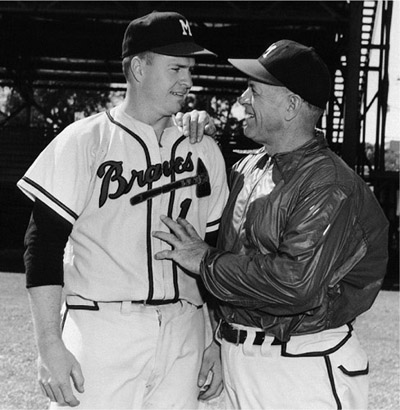
Braves catcher Del Crandall with manager Charlie Grimm (ROBERT KOEHLER COLLECTION)
On the field, our manager, Charlie Grimm, was the perfect fit for the Braves during those first few years in Milwaukee. He really knew how to mold us into winners by keeping the clubhouse light and not being very demanding. Us hardnosed players didnt need daily pep talks, so he just let us go out and perform. Although Charlie was not around to lead us into the World Series, we were all tremendously grateful for the opportunities he provided us to grow into Major Leaguers. In 1956, Fred Haney took the reigns from Charlie and was just what we needed. He demanded a lot from us as maturing ballplayers and guided us to a World Series victory in 1957. He knew how to polish us into champions.
Milwaukee Braves: Heroes and Heartbreak will take you on a journey through those glory yearsas well as when things started to fall apart. It was obvious to all of us in the clubhouse that something wasnt quite right with Milwaukee baseball after we won the 1957 World Series. But even with the front offices recalibrated approach towards replenishing the aging roster, the beer ban at County Stadium, and the arrival of new ownership, none of us couldve predicted the Milwaukee Braves eventual fate. I remember when I had been traded and came back as a member of the Giants and Pirates, it was obvious the Braves were in a lame-duck situation while rumors swirled about their eventual departure for Atlanta in 1966. As someone who truly cherished his years as a resident of Brookfield, Wisconsin, during my playing days, it broke my heart to witness the final days of the Braves in Milwaukee.

